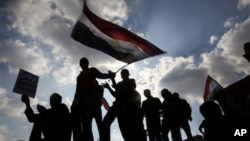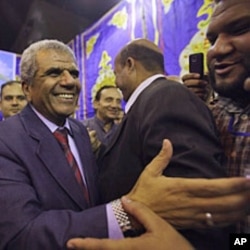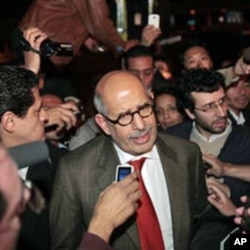This is Part 1 of a 3-part series: Egypt’s Transition
Parts 1 / 2 / 3
Since Egyptian President Hosni Mubarak was forced to step down last February, the Supreme Council of the Armed Forces took on the temporary rule of the country. According to the council’s plan, parliamentary elections will be held in September of this year, followed by presidential elections at the end of this year.
Egyptians are witnessing newfound freedom in forming political parties and getting ready for the country’s first free and fair parliamentary elections since the 1952 revolution. However, they are beginning to worry about what kind of political system will emerge from the ruins of the Mubarak regime.
Some two dozen parties will compete to win seats but many political parties especially the newly established ones will have no time to develop, organize campaigns and mobilize support. Mohammed Nosseir, a leading member of the Democratic Front Party established in 2007 said several liberal parties feel the military council has not offer a clear political roadmap.
“Currently what we are receiving is different kind of steps, Supreme Council of the Armed Forces produces laws every now and then, but we are not aware what will happen in the future.” said Nosseir. “A roadmap has not been produced yet and everyone is stuck and this is making a big confusion for all parties and individuals who are intending to participate in the elections. There is no really clear structure yet so each one can position himself.”
Islamists, Mubarak loyalists are coming
Given such a tight timeframe between now and September, Nosseir and leaders of other liberal parties fear a risk that the new parliament will end up with elected members from only few parties including the well- organized, well financed Muslim Brotherhood which would likely benefit from holding the elections so quickly. Nosseir said this will have serious implications for the new constitution as well as shaping the political future of Egypt.
“We need a clear law to define the role of religion in politics; if they can capitalize on religious slogans or not, if they can capitalize on churches and mosques where currently the Muslim Brotherhood has been capitalizing on this to push for their own agenda,” he said.
Historically, the most politically pervasive groups have been the Muslim Brotherhood and, until its recent court-ordered dissolution, the National Democratic Party, whose former members can reconstitute it under a different name.
Tug war between the military and the street
Many political parties are trying to push the Council of the Armed Forces to agree to postpone the parliamentary elections till a new constitution is drafted. One complaint which is widespread now in Egypt is that the military council issues decrees without regularly consulting with the representatives of the groups that started the revolution. Former U.S. Ambassador to the UAE, Bill Rugh visited Egypt recently and wrote an article entitled Revolution Is Incomplete.
He said Egyptians are still uneasy about the incompleteness of their revolution. Ambassador Rugh expects more public pressure to clarify the political roadmap of post-revolution Egypt.
“The street protesters continue to come out and make demands especially every Friday and they have had an influence on the military,” he said. “The Generals don’t have the habit of discussing their policies in advance with the public; they discuss it among themselves and then announce it. But if the people in the street are not happy with the decisions, they protest and those protests have had some influence.”
The lack of clarity prompted Al Wafd, the oldest liberal party in Egypt to form a coalition with the Muslim Brotherhood’s newly established Freedom and Justice Party and several junior parties to ease the fear that Egypt may become a theocracy. Al-Azhar, the main source of Islamic learning in Egypt weighed in the debate and declared there is no room in Islam for a “theocracy”. In a document signed by Muslim scholars and Egyptian Christian intellectuals, Al-Azhar called for a democratic transition that emphasizes separation of powers.
What role would the next president play?
Another question that is crying for an answer is the nature of the new political system in Egypt and whether it would be presidential or parliamentary system or a mix of both. In the past 60 years, Egyptian president was given a broad list of authorities that made him the absolute authority. Egyptians are tired of going from one Pharaoh to another but only the new constitution will define the limits of presidential powers. Ambassador Rugh discussed this dilemma with a presidential candidate.
“I had a conversation with Mohamed El-Baradei, who is one of the candidates for president and I asked him if he had any contacts with the Generals who are setting the rules and he said no," said Rugh. "And Mohamed El-Barade said that the Generals are not revealing their hand as to how the new political system will look, how much power the president will have. And he said how can I apply for a job if I do not know what the job description is?”
Will the military support a certain candidate?
Until recently most Egyptians shared with George Ishaq, founder of the pro-democracy protest movement "Kifaya” a prediction that there will likely be two front runners for presidential candidates this year; Dr. Baradei and Amr Moussa.
Mohamed ElBaradei, is former director-general of the International Atomic Energy Agency, and Amr Moussa, is the recent secretary-general of the Arab League. ElBaradei's principal, and significant, obstacle is that his support base is very narrow, having been an outsider to Egypt throughout his professional life. Moussa's principal obstacle is his previous, brief association with the Mubarak regime, though he fell out of favor and was removed from his post as foreign minister.
On the positive side, both have substantial international experience. But according to the latest Facebook poll conducted by Supreme Council of the Armed Forces, Mohamed ElBaradei is the most favorable candidate followed by Mohamed Salim Al Awa.
He is a moderate Islamist who just announced his intention to run as a presidential candidate. In the third place came General Ahmed Shafiq, a former civil aviation minister in the former regime. Skeptics are suspicious that the military council conducted the poll in order to define who the candidate the military would support is. But others said the military personnel are not permitted to vote anyway.
While the direction of Egypt’s political transition is still unknown, experts expect that if parliamentary elections are held in September, followed by presidential elections, most political forces, especially those which emerged during the revolution will not be represented in the parliament or have a say on the new constitution. That means the likely winners in the upcoming elections will be the Islamists and remnants of the Mubarak dissolved party: the National Democratic Party.






